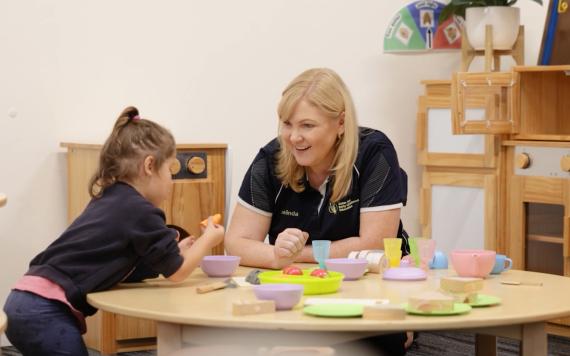Young children are actively learning wherever they are – at home, in early learning programs, at school and in the community. This ‘early’ learning is fundamental to their development and significantly shapes their future learning, health and wellbeing outcomes [1].
The term ‘early childhood education’ (ECE) encompasses all forms of education, both formal and informal, provided to young children up to approximately 8 years of age.
High-quality early childhood education benefits all children, but there are particular benefits for children who are vulnerable or come from disadvantaged backgrounds.
The importance of family engagement in a child’s learning journey
“Parents have a particularly important part to play in the educating community, since it is to them that primary and natural responsibility for their children’s education belongs.” [2]
In a Catholic school context, parents play a very important role as the first and continuing educators of their children.
The research also tells us that:
- As 90% of a child’s brain development occurs before the age of five, the role of families is critical in early learning. [3]
- When families are engaged in their children’s learning at school positive benefits accrue for students’ achievement and wellbeing. [4]
- It doesn’t matter who families are, it’s what they do that matters. Every family has an important role to play in helping their children to become confident and motivated learners. This is true regardless of parent occupation, education, or income. [5]
- Home/school partnerships are critical to student success and to achieve this, parents need our support. [6]
“The research consistently confirms that family engagement is one of the most powerful predictors of children’s development, educational attainment, and success in school and life.” [7]
We also know that the strongest predictors of effective parent engagement are the teacher practices and the programs the school has in place. The Early Years Foundations for Learning Literacy and Numeracy resource aims to support schools and families in this work. [8]
The National Family School Partnership Framework and the Gearing Up for Parent Engagement Resource are two excellent resources for schools wishing to develop stronger partnerships with families.
The importance of play
Play has benefits for a child’s learning and wellbeing.
Play helps children with their:
- physical development through the development of fine and gross motor skills;
- social development by developing skills such as, collaboration, negotiation and conflict resolution;
- emotional development by developing self-regulation and empathy for others;
- cognitive development through the development of creative and critical thinking;
- literacy development; and
- numeracy development. [9]
Links to research
- Do parents know they matter? Engaging all parents in learning
- Let’s Read Them a Story! The Parent Factor in Education
- ARACY Parent and Implementation Guide
- Australian Early Development Census
- Parent engagement: What is Parent Engagement, ARACY, 2019
- Lifting Our Game report: Report of the Review to Achieve Educational Excellence in Australian Schools Through Early Childhood Interventions
- Why is play important?
- Giving parents a voice: Strategies to enhance parent capacity to support transition to school
- A New Wave of Evidence: The Impact of School, Family, and Community Connections on Student Achievement
[1] Eadie, T. (2019). Why Early Childhood Education is Everyone’s Business. Pursuit, University of Melbourne.
[2] Congregation For Catholic Education (1997). The Catholic School On The Threshold Of The Third Millennium.
[3] Center on the Developing Child (2007). The Science of Early Childhood Development (InBrief).
[4] Australian Government Department of Education, Skills and Employment (2008). The Family-School Partnerships Framework.
[5] OECD (2020). Why parenting matters for children in the 21st century: An evidence-based framework for understanding parenting and its impact on child development.
[6] National Center for Family & Community Connections with Schools (2002). The Impact of School, Family, and Community Connections on Student Achievement.
[7] Global Family Research Project (2018). Joining Together to Create a Bold Vision for Next Generation Family Engagement: Engaging Families to Transform Education.
[8] Australian Government Department of Education, Skills and Employment (2008). Parent Engagement in Learning.
[9] UNSW Sydney (2020). Why is play important?
